#Attachment theory
Text
Disorganized (aka fearful-avoidant) attachment style is overanalyzing/overcorrecting when you think your partner might be pulling away from you, but then pulling away from them when they draw close to you.
It is both craving AND fearing intimacy so deeply that you grip people tight in your hands lest they leave you, but keep them at an arms length lest they love you.
#disorganized attachment#disorganized attachment style#fearful avoidant#fearful avoidant attachment#fearful avoidant attachment style#attachment styles#attachment theory#anxious attachment#avoidant attachment#relationships#long distance relationship#long distance relationships#ldr#ldr love#queer relationships#queer love#intimacy#fear of intimacy#craving intimacy#secure attachment style#insecure attachment#insecure attachment styles#attachment styles can be healed#attachment styles can be changed#childhood wounds#healthy relationships#healthy relationships are possible
4K notes
·
View notes
Text
When love is unreliable and you are a child, you assume that it is the nature of love – its quality – to be unreliable. Children do not find fault with their parents until later. In the beginning the love you get is the love that sets.
Jeanette Winterson, Why Be Happy When You Could Be Normal?
#Jeanette Winterson#love#attachment style#insecure attachment#anxious attachment#avoidant attachment#attachment theory#trust#trust issues#relationship#breakup#heartbreak#recovery#healing#self awareness#personal development#personal growth#quotes
2K notes
·
View notes
Text

Susan Nathiel, Daughters of Madness
258 notes
·
View notes
Text
allow yourself to be unlikable
1K notes
·
View notes
Text
Unresolved abandonment is the root of self-sabotage.
Susan Anderson, The Journey From Abandonment to Healing
#Susan Anderson#quotes#The Journey from Abandonment to Healing#abandonment#abandonment wound#attachment theory#attachment styles#anxious attachment#psychotherapy#psychology#self help#mental health#fearful avoidant#dismissive avoidant#heal#self healing#self sabotage#self esteem#personal growth#personal development#breakup recovery#breakup
847 notes
·
View notes
Text
Utsukushii Kare master post
With Utsukushii Kare: Eternal becoming available on streaming in Japan and rumors of international streaming distribution on the horizon, I thought this might be a good time to do a roundup post of all of my meta writing on the series so far. There's quite a bit of it. Between the complexity of the psychological themes in this series and my capacity for hyperfocus, I ended up with a lot to say.
In case it doesn't go without saying, this post is subject to change as I continue to post on this topic.
The psychological paradoxes of Utsukushii Kare
This is a series of posts (the current plan is to write three installments) about what it says on the tin: paradoxical psychological dynamics in Utsukushii Kare. These are things about the characters that may seem contradictory at first but can be accounted for by digging deeper into some psychological concepts. These posts are focused on the series (both seasons) but will draw from the movie and from the novel and related stories when they illustrate points about the series.
Part 1: Covert grandiosity and finding status through idealization - A pretty deep dive into 1) the subtle ways Hira shows that while his self-image can be highly negative in some ways, in other respects he feels superior to others and 2) how by elevating Kiyoi’s status and humbling himself in comparison, Hira attains a different kind of status.
An addendum of sorts to part 1: Hira's parents and his self-defeating tendencies - Some guesswork about how Hira's parents could have contributed to his self-defeating personality, with some further discussion of specific self-defeating strategies he uses in his relationship with Kiyoi and elsewhere.
Utsukushii Kare through the lens of pursuer-distancer dynamics and related psychological concepts:
The pursuer-distancer dyad & how it applies to the world of BL - a primer on this psychological concept and how it applies to BL generally, with a brief reference to how this concept applies to Utsukare (also touches on Semantic Error and talks in detail about an example from To My Star 2). This one isn't super focused on Utsukushii Kare but is pretty de rigeur for understanding my UK posts on this topic.
Paradoxical roles; or, I think I finally figured out the pursuer-distancer dynamic in Utsukushii Kare - This post comes after some of the posts listed below but I recommend reading it first as this is really where (I think) I cracked the code on this aspect of the story.
Pursuer-distancer roles & attachment style in Utsukushii Kare, Part 1: Hira - In-depth discussion of Hira's role in the pursuer-distancer dyad, his attachment style, and his personality
Pursuer-distancer roles and attachment style in Utsukushii Kare Part 2: Kiyoi - In-depth discussion of Kiyoi's role in the pursuer-distancer dyad, his attachment style, and his personality
Re-evaluating pursuing & distancing in Utsukushii Kare season 1 - super detailed post working out my thoughts about pursuing and distancing in season 1
On the way Sakai Mai (the series' director) uses seme left, uke right framing and its significance in BL and other Japanese media:
Using an example from the s2e1 with the girl who hits on Hira at a party (via a reblog of a gifset from @nanons)
On the way Sakai flips Hira's and Kiyoi's position in the frame in two versions of the same scene and what it tells us about its significance
How the persistent/cute trope plays out in Utsukushii Kare season 2, plus related overanalyses of the big season 2 finale kiss:
The persistent and the cute (how "persistent" and "cute" are code words with specific meanings in BL/yaoi/other drama and manga genres/Japanese culture more broadly)
Analyzing the season 2 finale kiss in light of seme left/uke right framing and the persistent/cute trope (in a reblog of a gif post by @nanons)
Reblogging @bl-bracket to lobby for the season 2 finale kiss, with more overanalysis
Fragrance nerd discussion:
This bittersweet fragrance - on the significance of osmanthus/tea olive in Utsukushii Kare season 2, with additional information on the possible significance of the fragrance of osmanthus and perfumes that are either osmanthus soliflores or feature prominent osmanthus notes
Posts on specific season 2 episodes:
initial thoughts about S2e1
Additional (informal) thoughts on s2e1
S2e1 rundown
Hira's incongruous/misaligned affect at the end of s2e1
S2e2 rundown
on S2e2, including pursuer-distancer dynamics and seme left, uke right
Utsukushii Kare S2E4: “face me straight on” (mostly discussing relationship dynamics pointed out in topic-specific metas)
on Utsukushii Kare: Eternal:
Kiyoi and Anna: on Kiyoi’s friendship with Anna and its significance for his personal growth
#utsukushii kare#utsukushii kare meta#utsukushii kare analysis#utsukushii kare season 1#utsukushii kare season 2#utsukushii kare 2#utsukushii kare eternal#utsukushii kare: eternal#hira x kiyoi#japanese bl#jbl#my beautiful man#psychology of bl#pursuer distancer dynamic#attachment theory#attachment style
203 notes
·
View notes
Text
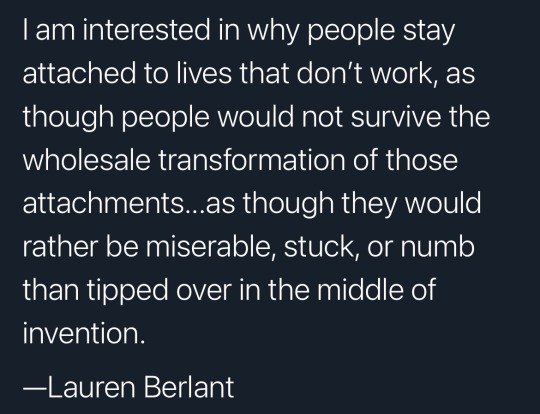
this is soooo loa-ditch-the-old-self-coded. i fucking love the phrase “tipped over in the middle of invention.” be brave enough to persist in your invention.
#loassumption#law of assumption#loa#loa tumblr#loa blog#quotes#writing#self belief#self love#reinvent yourself#reinvention#attachment theory#attachment styles#manifestation#law of manifestation#manifesting#desire#fulfillment#change yourself#change your life#live in the end#wish fulfilled#it is done#quantum leap#self concept#neville goddard#edward art#mindset#imagination#states of consciousness
90 notes
·
View notes
Text
now that people are starting to recognize love languages as heteronormative nonsense, can we just talk about the pop psychology application of attachment theory for a second?
I know I'm not the only one who has noticed the fixation on Anxious vs. Avoidant Attachment. But is it me or does this false dichotomy sound suspiciously like a proxy for gender essentialism??
#attachment theory#anxious attachment#avoidant attachment#insecure attachment#gender essentialism#heteronormativity#gender roles#pop psychology#love languages
29 notes
·
View notes
Text
there are two wolves inside me (i have disorganized attachment)
37 notes
·
View notes
Note
It seems like you're thinking of a partner as more of a therapist than a partner...
noo big difference, but there are similarities. i’ve seen a lot of avoidants have this response, where they are comfortable dumping trauma, work difficulties, family issues, past relationship issues, mental health issues, etc on partners but then when their partner has issues and goes through mental health crises, they leave them.
in therapy, there isn’t a mutual space. one person pays the other to listen, advise, validate, etc. the dynamic is inherently manipulative- you’re seeing the best part of someone. it is their job (and an important one). but there’s a reason couples therapists give out homework… the actual work is between the two partners
partners should also include this- but on a mutual level. there is space for both experiences. partnership should be safe spaces where forgiveness, healing, acceptance, and accountability exist. you don’t just dump emotional baggage on your partner then leave them the way you do a therapist. it’s a mutual experience, where you both share and work through emotional, mental, spiritual experiences together. sharing vulnerabilities and being there for one another during tough times is literally a major component in relationships.
even just in friendship, this should exist. whenever a friend of mine hurts me, i don’t point fingers that they’re a bad person. i reflect on why that happened, how they grew up, what i know about their past, what would have informed that response, why they maybe haven’t been feeling safe, etc. i communicate immediately (not wait a month to bring it up) and hold them accountable to hurting me while also extending forgiveness and empathy, thinking of the little kid that’s hurting inside them. if they’re willing to accept responsibility for their actions and can reflect on what’s going on, willing to work to do better- amazing! an opportunity for trust and growth :) if they fire back, blame shift, shut down, withdraw, etc- then that’s someone who isn’t emotionally available for growth.
therapy can help build, strengthen, and repair relationships- but only if those actions are also happening in the relationship. a partnership without active forgiveness, mutual healing, a desire to work to understand the other, & to become better partners for each other, isn’t partnership.
the perfect partner doesn’t exist. in reality, people fuck up. they hurt each other. those that love you will recognize this, take responsibility for it, and express a desire to do and be better. those that love you will stay. those that give up, that leave, that don’t own up to their mistakes, that can’t extend forgiveness, that don’t care to understand why their partner functions a certain way, that don’t care to heal and be better… those people aren’t built for real, authentic partnership.
so, to conclude.
there is a stark difference between leaning on your partner for support & having your relationship needs met by them vs having them be your therapist. unfortunately, many ppl who run more disorganized/avoidant can shut down when their partners need to rely on them and start showing their own wounds. then they will say “you didn’t want a partner, you wanted a therapist” … in reality, they wanted a partner who genuinely meant for better & for worse, who loved them enough to stay when it got hard & support healing- not be responsible for it. those people who shut down when their partner has emotional baggage, wounds, and flaws need to reevaluate what relationship means to them, what it looks like, and open up communication instead of withholding, ruminating, and withdrawing from their partner
#queer theory#attachment issues#attachment theory#avoidant personality disorder#butch#butch appreciation#borderline personality disorder#butch love#femmebait#femme appreciation#femme love#butch lesbian#butch daddy#lesbian yearning#butch4brat#sapphic yearning#butch dom#masc lesbian#lesbian daddy#soft butch#stone butch#butch4femme#butch dyke#butch4butch#i love butches#butch nsft#butch bait#queer community#queer#butchfemme
49 notes
·
View notes
Text
Anxious attachment styles are typically anxious to receive the love that they never received in childhood (even if it’s in unhealthy ways)
Avoidant attachment styles are typically afraid of love because love normally meant harm when they were a child (so they push away people they probably shouldn’t)
And disorganized people are typically afraid of love but are also anxious to receive the love they never received in childhood (so they either look for it in unhealthy ways or relationships become complicated due to the fear)
#attachment styles#attachment theory#anxious attachment#avoidant attachment#disorganized attachment#relationships#anxious attachment style#avoidant attachment style#disorganized attachment style#I don’t know why I posted this now#just relflecting I guess
53 notes
·
View notes
Text
Researchers studying the kinds of problems adolescents have when they have insecure attachments have found that girls with dismissive attachments...are more likely to develop eating disorders of some kind and to focus their energies on controlling internal emotional states by controlling food intake. There’s some good evidence that the food restriction typical of anorexia causes the brain to release endorphins, since starvation signals ‘‘emergency’’ to the brain. Endorphins cause a ‘‘high’’ feeling and relief of anxiety, quickly and reliably, and can be as addictive as drugs that are ingested. It may be the addiction component that makes eating disorders so difficult to resolve.
Susan Nathiel, Daughters of Madness
91 notes
·
View notes
Text
Crowley + Attachment Style
I was talking to @actual-changeling the other day about attachment styles, and they confirmed my idea that Crowley is, contrary to popular belief, not someone with an anxious attachment style. Rather, like Aziraphale, he exhibits signs of a fearful-avoidant/disorganized attachment style (just in a slightly different and less obvious way). I’ve had this draft kicking around since September (??? October?? time is an illusion), so enjoy my silly (not-so-little) ramblings.
TW // discussion of child abuse (not explicit)
Okay, I've seen a couple of discussions surrounding this (cue me doing a frantic, sleep-deprived Tumblr Literature Review approx. five minutes ago), so this is just me tossing two pennies into a fountain, shrugging, and walking away.
I totally see how Crowley could be interpreted as having an anxious attachment style. At the same time, as someone with a fearful-avoidant/disorganized attachment style (thanks, dad! <3), I believe there's space to explore that as a possibility.
My credentials, you ask?? Decades of trauma and an intimate knowledge of what it's like to have a disorganized attachment style (I'm WORKING ON IT, okay?? lol). Also a fuckton of research. All sources will be linked because I am a professional (<- LYING).
Okay, so let's do a quick crash course on attachment theory as a concept itself, and then shift into manifestations of disorganized attachment style (I'm going to call it "DAS" for short bc I'm tired). I'm doing this as a formality, because let's be honest. Would you be in this fandom without having had experienced at least some measure of childhood trauma?
What is Attachment Theory? (source)
"Attachment theory, in developmental psychology, [is] the theory that humans are born with a need to form a close emotional bond with a caregiver and that such a bond will develop during the first six months of a child’s life if the caregiver is appropriately responsive."
There are a variety of attachment styles, each of which differently predicts how an individual will react in interpersonal situations according to how they were raised. While there are, obviously, further nuances to this, a core group of four feature most prominently:

Let's go deeper. What does it mean to have a DAS? In short, a DAS (also known as "fearful-avoidant attachment style") often comes about as a result of childhood abuse. The child relies upon the caregiver to ensure their (the child's) survival. However, when the parent is abusive (physically, emotionally, verbally, etc.), this obviously poses a threat to the wellbeing of the child. So they develop this deep-rooted sense of distrust and fear. It helps me to think of it as a flame: you want to be warmed by the heat of the fire, but if you get too close, you'll get burnt. Consequently, you're trapped in this wavering "too close", "too far" situation.
One of the best explanations I've read with regards to DAS is from this source:

Separation and abandonment (though most likely to produce an organized form of attachment, such as anxious or avoidant) can lead to the establishment of a DAS:

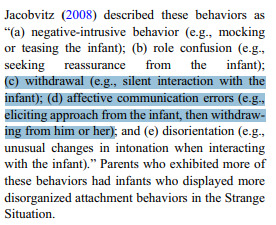
(source)
After experiencing abuse and abandonment in Heaven, and again as a Fallen angel, Crowley has, like Aziraphale, been exposed to conditions that would create this particular attachment style (for a further explanation of Aziraphale's DAS, see this post).
However, as I mentioned in the above linked post,
In contrast, Crowley has a more nuanced, consequentialist view of morality. Having Fallen, having intimately known the depths of what both Heaven and Hell are capable of (e.g., his time in Hell post-1827), he isn't living with this unpredictable "parent"--he solidly understands that the existing system is fundamentally wrong.
At times, he does experience what appears to be ambivalence (or, more likely, a sense of deep-rooted loss and abandonment):


However, the Final Fifteen emphasizes that this lingering mindset is overridden by the acknowledgment of an innately harmful structure:
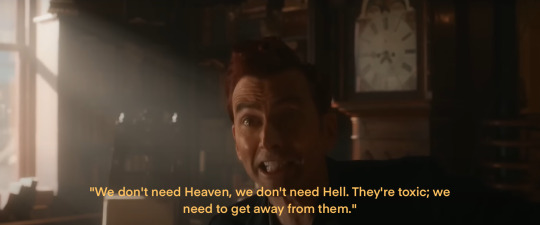
Having established this, what does Crowley's DAS look like + how does it differ from Aziraphale's?
Well, in my research, I would posit "compulsive caregiving" plays a role.
Compulsive Caregiving
What is "compulsive caregiving"? It's a form of DAS that emerges as a result of specific developmental conditions. Having their needs (or QUESTIONS) ignored or else punished by a caregiver, a child may learn to "never ask for anything", and instead care for others, often sacrificing their own wellbeing/needs for the sake of the other party (see further explanations below).

(Sources: 1, 2, 3, 4)
Here, we can see how Crowley might fall into the category of "compulsive care-giving". Both he and Azi try to protect each other to a severe degree, but Crowley's compulsivity might be a bit more apparent in this regard.
He's learned not to ask for the things he wants (avoidant manifestation), but he also feels a desperate need to prove himself and protect Aziraphale through compulsive caregiving (anxious manifestation). It's only with his back pressed against the figurative wall in the Final Fifteen (or on the brink of Armageddon in season 1) that he is able to say it plainly.
The Push-And-Pull of DAS
As has been discussed so many times previously, this idea of ambivalence also features prominently in the relationship between Crowley and Aziraphale themselves. There's a constant push-and-pull in their dynamic, as evidenced below:
Aziraphale refers to him as a friend, he compliments him, exists in close quarters with him, etc...

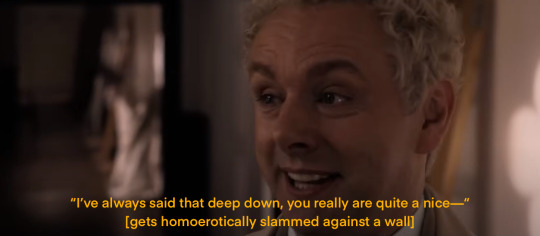
But he also pushes Crowley away and consistently reiterates the categorical black-and-white thinking of Heaven/Hell.

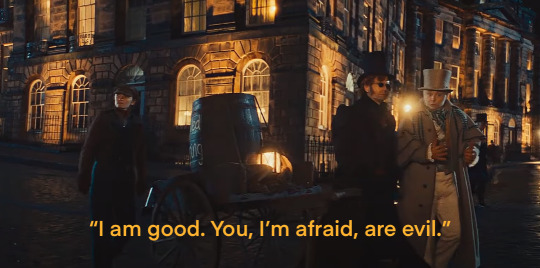
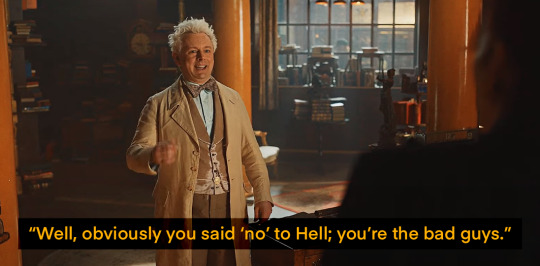
[Disclaimer: I acknowledge that this wavering attitude, while infuriating and unfair to Crowley, is also largely as a result of religious trauma; Aziraphale needs some serious therapy. As we see exhibited throughout the Final Fifteen, Aziraphale still believes that Heaven is, fundamentally, good (or at least holds the capacity to become good). This doesn't negate the fact that he loves Crowley, but it does impact the way he views the two of them and their relationship, causing a significant strain and eventual break in their bond].
So we have the root, we have the manifestations within the other party, but how does this DAS figure within Crowley's character itself?
Manifestations of DAS in Adulthood
Speaking from personal experience, DAS can manifest in adult life in several ways. In the present day, I tend to (But not always! I'm getting better, lol) attach myself to people who are touch-and-go; who variously show me affection and disinterest (*cough cough* my ex-bsf). Often, when I felt like the other person was pulling away/withdrawing, I would also pull away. Because my caregivers flipped between rage and calm, venom-spitting hatred and comforting affection very, very quickly and very, very easily, I had to constantly be on edge, anticipating my next move and ready to go into resolution/fawning mode ("compulsive caretaking") at the drop of a hat. And that notion of push-and-pull, "never really knowing where you stand" is what I grew up thinking of as love.
This pulling away in the face of perceived rejection can also point to issues with self-esteem...
SIDEBAR: CROWLEY AND SELF-ESTEEM
The way Crowley is written with regards to his trauma responses is so interesting and also so real to me. We have this entity who has spent the better part of six thousand years (likely more, because we don't have a definitive timeline for the Fall) believing he is so thoroughly and utterly unwanted as to be pushed to the underbelly of the Universe, hidden away amongst sulphur and agony and absence.
Speaking as someone with ah...childhood...uh. issues (sure, let's call it that. why not?), after being told that you are disgusting, horrible, unworthy, etc. so many times, you begin to believe it. And because, as children, we're forced to rely on primary caregivers, often the only way to maintain that connection lies in the internalization of that unworthiness, to the point where it's difficult to separate you from these ideas of worthlessness. And because you've experienced it so consistently throughout your life, you also come to anticipate rejection; you look for it everywhere, feeling as though it's right around the corner. Therefore, to kind of pre-emptively avoid emotional harm (or because you feel unworthy of asking for more or for reassurance), you cauterize the figurative wound and pull away. We'll come back to this idea in a couple moments!
Returning to the main point, let's look at these markers of a DAS more broadly:
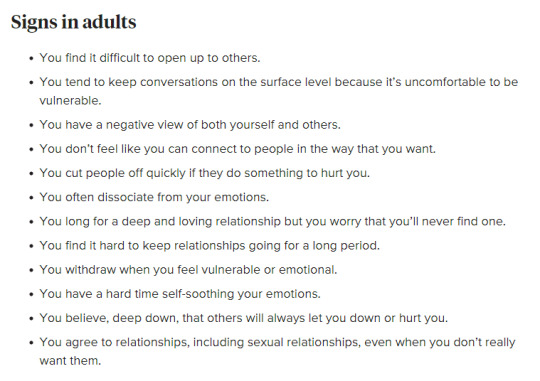
(source)
Let's go through each of these, step-by-step. Again, remember, not all of these symptoms have to be present all of the time.
These are the ones I see most prominently in Crowley (of course, please, please, please feel free to correct me or build on this! i'm in NO way an expert).
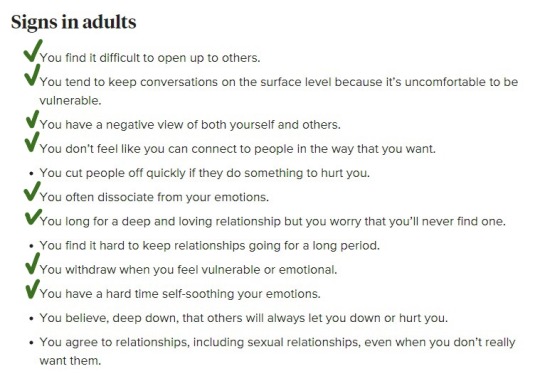
"You find it difficult to open up to others" + "You tend to keep conversations on the surface level because it's uncomfortable to be vulnerable"
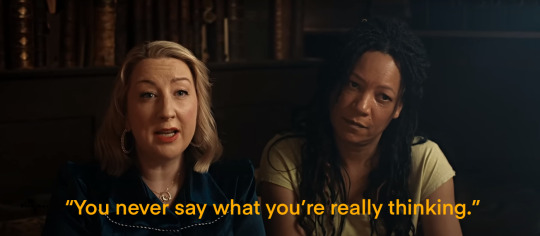
"You have a negative self-view of both yourself and others" (mostly himself, in this case!)
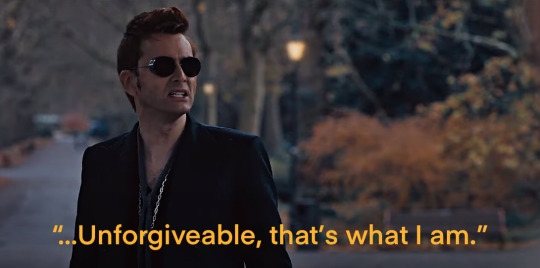

"You often dissociate from your emotions" + "You withdraw when you feel vulnerable or emotional"
For this one, I'm just going to invite you to read Alex's post here. They phrase it better than I ever could, lol.
SIDEBAR #2: Withdrawal + Good Omens Lockdown
@yowlthinks also made an excellent point regarding something i said here. In the Good Omens Lockdown audio clip, we notice Crowley pushing the boundary line, forthrightly offering to come over to the bookshop and stay for a while at the height of the pandemic (see below):


When Aziraphale outright rejects him, Crowley recoils and quickly says goodbye, intending to set his alarm for July. Here, we see the way in which disorganized attachment operates as a fusion of both anxious and avoidant behaviours; despite wanting to be close, he pulls back immediately and (presumably) resolves not to discuss the fact that he lost his flat and is now sleeping in his Bentley. (As my former philosophy professors have tried to impress upon me so many times,) It's important we consider alternative explanations. It could be possible that this is just him respecting Aziraphale's boundaries and returning to practices that seek to remedy the whole "you go too fast for me" issue. However, this kind of behaviour occurs time and time again, establishing a pattern that goes beyond simply protecting Azi's boundaries, and may index a desire to keep himself safe through emotional avoidance.
"You have a hard time self-soothing your emotions"
[insert lightning scene here]. He's trying, you guys. He's trying so hard, but it's difficult (and i'd genuinely like to get a scene in s3 where he's allowed to be well and truly angry. no, i'm totally not projecting, why do you ask? what are u, a cop???)! It seems that he turns to repression in the absence of actual emotional processing or soothing (until it comes out all at once, in the case of the lightning). This makes sense, as well, considering there have been very few instances in which he's been truly comforted or soothed by others. Not having comfort modelled to him, combined with his pre-existing low self-esteem helps to illuminate why he turns to repression opposed to taking time to care for himself, etc.
Broader Implications + S3 Speculation
Alright, we're almost done, I promise! So we've established (or at the very least, put forth an argument for) disorganized attachment in Anthony Janthony Crowley. What does this mean in the context of where we left things off at the end of S2?
From my perspective, it means that what happened was completely in-character for both of them. Aziraphale's DAS manifests in more of the traditional, hot-and-cold fearful-avoidance. For Crowley, his caretaking compulsivity finally snapped in the Final Fifteen; Heaven is one place he cannot follow, and exhausted, he walks away (only to stand out on the street, further pointing to the anxious/avoidant duality). I would argue that there was no trick, nothing in the coffee, no coded messages, etc. Rather, like humans, they are both shaped by their trauma and responded in accordance with this.
(@actual-changeling has some excellent metas where they further expand on the idea that there was no trick involved in the final fifteen: x. this meta too!: x. massive credit to them, as always hehe)
What about in S3? Speaking from personal experience (because the surrounding literature wasn't super helpful haha), a disorganized attachment style must be unlearned, with a few key factors at play:
Since DAS is grounded in formative experiences of volatility, the survival of the individual has to be decoupled from the preservation of connection (with family members, partners, friends, etc.); more specifically, your worth and ability to persist is not dependent on maintaining connection with another. This is incredibly difficult to unlearn when you've experienced it for a couple decades, let alone so many thousands of years. t h e r a p y (pls neil, i need an episode where it’s just Crowley going to see a psychiatrist and he breaks down crying and it’s like “oh yeah. that was really fucked up what happened to me”. again. totally not projecting! <- as always, don’t actually send stuff like this to Neil).
Okay, finally. We're at the end. I apologize for the sheer length of this analysis. I had to cut it off here, because the original was going to be wayyyyy longer with more discussion/analysis/etc. However. I am TIRED. So here you go!
✨TaH DaH! ✨
(please don't yell at me ajsdlasjkd. i love azi and crowley both so much and this is just my own interpretation/opinion as someone with a disorganized attachment style lol)
#AGAIN TO REITERATE: this is not attacking aziraphale. i love that guy (gn). i would die for him#this is just me highlighting some ideas i had ab attachment style#there are so many gaps in this but my brain is all foggy rn. sorry ahdasdguhgh#i'm so sorry this is so long btw. i got talking to alex and both our brains went nyooooom#good omens meta#good omens#gomens#crowley#ineffable husbands#good omens 2#aziracrow#aziraphale#go2#ineffable lovers#ineffable wives#good omens season 2#gomens 2#david tennant#gomens meta#attachment theory#long post#michael sheen#tw: childhood trauma#tw: child abuse#REALLY LONG POST#final fifteen#good omens analysis#no nightingales#good omens renewal#neil gaiman
55 notes
·
View notes
Text
For all of its pain and intensity, abandonment serves as a catalyst for profound personal growth.
Susan Anderson, The Journey from Abandonment to Healing
#Susan Anderson#The Journey from Abandonment to Healing#quotes#heal#abandonment wound#abandonment#personal growth#personal development#psychotherapy#psychology#attachment styles#attachment theory#anxious attachment#fearful avoidant#dismissive avoidant#self worth#self help#self esteem#mental health#breakup recovery#breakup
197 notes
·
View notes
Text

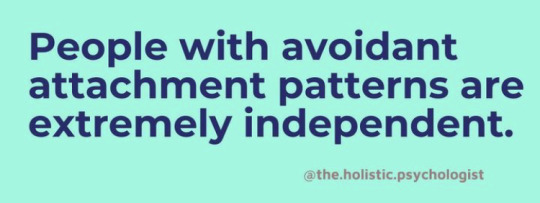
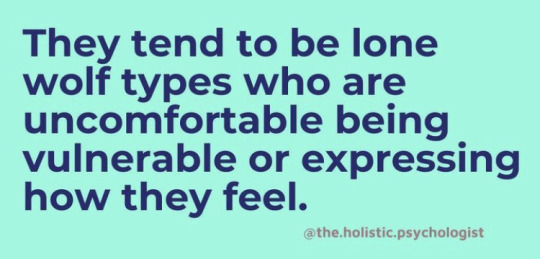


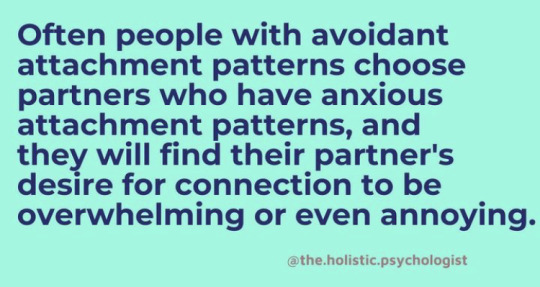
268 notes
·
View notes
Text
How Our Childhood Shapes Our Adult Relationships

When we are infants, our first relationships are with our caregivers, usually our parents. Attachment theory points out that these first connections would later contribute to how we relate to different people. It is like a map choosing which paths to follow when we grow up.
If you, at least, had great parents who were loving and kind, you would certainly feel secure in relationships, trusting other people and having a sunny disposition of yourself. However, when your caregivers had demonstrated the same behaviour you might feel that relationships you have now are a risk for you. It was either "They've let me down in the past so I know better than to let my guard down" or "before I was momentarily hurt and now I am wary of any risk."
By getting acquainted with them we could benefit from these insights and increase the level of our relationships. Thus, by realizing what our attachment behavioural pattern is---being secure, anxious, or avoidant---we can start the process of personal growth. In this regard, we become capable of having more productive communication, making ourselves more (open, and let out), and developing our partnership qualitatively.
Therefore, determining how our past has its pull on the present will enable us to have better relationships due to it. It enables you to know the schematics you need to construct a fort using loving and strong connections.
20 notes
·
View notes